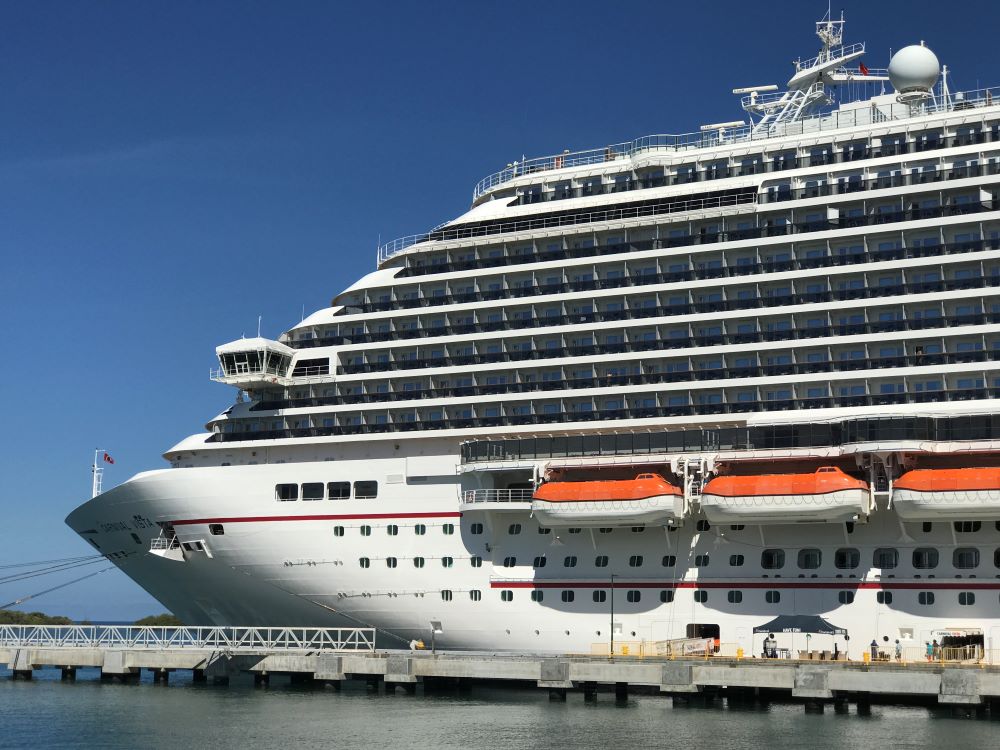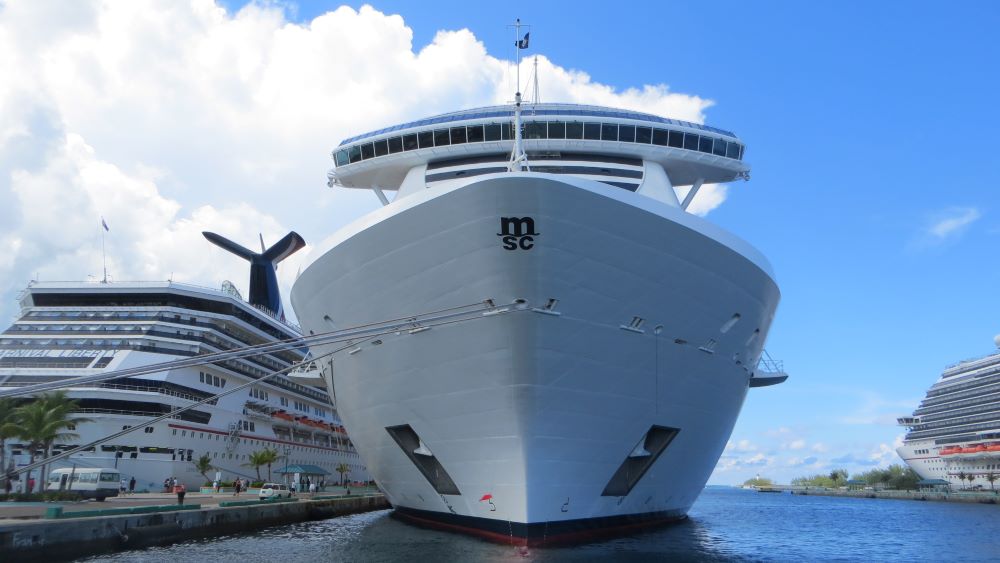Will your next cruise see a fuel supplement charge? And what exactly is the charge anyway? We dive into all the details below…

If you think that it costs a lot to fill up your gas tank, imagine the fuel bill for a cruise ship. Each year cruise lines spend hundreds of millions — if not billions — of dollars on keeping their ships fueled as they crisscross the world.
In fact, in 2019 (the last full year before the health crisis), Carnival Corporation spent more than $1.5 billion on fuel for its ships. That comes out to more than $4 million per day across all its cruise lines.
Of course, recently the price of oil has skyrocketed to more than $100 a barrel. With that, you can expect fuel costs to rise too. While financial hedges put in place by the cruise companies do temper this price increase, there’s no escaping that higher fuel prices eventually hit the bottom line.
One company — Norwegian Cruise Line Holdings — said in a recent financial filing that they “estimate that a 10% increase in our weighted-average fuel price would increase our anticipated 2022 fuel expense by $63.3 million.”
But the cruise lines aren’t powerless against higher prices. The most obvious way to offset the higher cost is with higher cruise fares to cover the increase. But there is another tool that is less well-known: fuel supplement charges.
If taking a cruise during a period of high oil prices, there is a possibility that this charge could come into play. Here’s everything you should know about fuel supplement charges on a cruise.
In This Article...
What Is A Fuel Supplement Charge?
As the name implies, this charge is an extra fee tacked onto your cruise to offset the price of fuel for the trip. Most of the time there is no fuel supplement charge. But if you search through the terms and conditions of your ticket contract, you’ll often find a notice about a possible fuel charge should the price of oil rise above a certain threshold.
For instance, if the price of crude oil is above $70 per barrel (the “trigger price” varies with each line, and some don’t specifically mention a price), then a cruise line reserves the right to tack on this extra charge. This is even if you’ve already paid for your cruise.
Just because oil is higher than that level, however, doesn’t mean that the charge is automatically applied. It’s at the cruise line’s discretion.
How Much Is The Fuel Supplement Charge?
If a fuel supplement charge is put in place for your cruise, the price varies by cruise line.
For example, Carnival lays out in their terms and conditions that the cruise line reserves the right to charge up to $9 per person, per day. So on a seven-day cruise, that would be an extra $63 per person.
Norwegian Cruise Line has a similar policy, but says their charge “will not exceed $10.00 per passenger per day.”
Other lines like Royal Caribbean simply state that a charge could occur, but don’t mention a specific price in their terms.
When Can The Charge Come Into Effect?
The implementation of the fuel charges are a little tricky.
Some cruise lines lay out a price per barrel of oil, above which the charge can be implemented. For example, Carnival says that when the price of oil is more than $70 per barrel according to the New York Mercantile Exchange Index (NYMEX), then it can charge the fee. Norwegian Cruise Line uses a price of $65 per barrel.
But just because the price of oil is higher than that doesn’t automatically mean there is a charge applied. For instance, as of now we aren’t seeing lines implement the charge yet, even with elevated oil prices.
Does Every Cruise Line Have A Possible Fuel Surcharge?
Not every cruise line lays out fuel supplement charges, but many do. You can search through the terms and conditions of your cruise line and/or the passenger ticket contract to see what is mentioned.
Of the major cruise lines we searched, most do mention the possibility of a fuel charge. Here are the details of the three major lines:
Carnival:
Carnival reserves the right to charge a fuel supplement of up to $9.00 USD, or its equivalent in foreign currency, per person per day, without prior notice, in the event that the price of light sweet crude oil according to the NYMEX (New York Mercantile Exchange Index) is greater than $70.00 USD per barrel of oil.
Norwegian Cruise Line:
Norwegian Cruise Line reserves the right to charge a fuel supplement without prior notice should the closing price of West Texas Intermediate Fuel increase above $65 per barrel on the NYMEX (New York Mercantile Exchange Index). In the event a fuel supplement is charged, Norwegian Cruise Line will have sole discretion to apply the supplementary charge to both existing and new bookings, regardless of whether such bookings have been paid in full. Such supplementary charges are not included in the cruise fare. The fuel supplement charge will not exceed $10.00 per passenger per day.
Royal Caribbean:
Operator reserves the right to impose a supplemental charge relating to unanticipated occurrences including, but not limited to, increases in the price of fuel. Any such supplement charges may apply, at Operator’s sole discretion, to both existing and new bookings (regardless of whether such bookings have been paid in full). Such supplements are not included in the Cruise or CruiseTour Fare.
Other lines like MSC and Celebrity also make mention of possible charges due to fuel costs. On the other hand, we did not see mention of fuel charges for Princess, Holland America, or Disney.
I Already Paid For My Cruise. Can I Still Be Charged?

Yes. In the passenger contracts we’ve reviewed, each make it clear that the charge can be applied even if you’ve already paid in full for your cruise.
So you could have paid for your cruise months ago and see another charge to your account if the cruise line decides to implement the fuel supplement.
Can I Cancel Due To The Fuel Charge?
At this point, it’s not clear if the implementation of a fuel charge after you’ve booked would give you an “out” you to cancel the trip and receive a refund.
Carnival is among the most forthcoming with the terms of any charge and they specifically state in the ticket contract that “no right of cancellation shall be implied.”
Other lines make no mention that we’ve seen about whether or not you can cancel due to the extra fee. If the fee is actually imposed, then we’d expect to also see more clarity on how it might impact cancellation policies.
Will I Know About The Fuel Supplement In Advance?
The official policies we’ve read regarding this charge have language about implementing the policy at the cruise line’s “sole discretion” or “without prior notice” and they “reserve the right” to place the charge or not.
In our opinion, we find it unlikely that this would just be sprung on passengers with no warning. That would mean lots of upset guests. Instead, we’d expect that if these charges are put in place, then there would be ample notice.
For example, when gratuity prices are increased for a cruise line, there is usually several weeks or months notice before the change. Meanwhile, passengers that have already booked their trip are normally grandfathered in under the older rates.
While the language of the policies seems to give power to implement the fuel supplement charges on short notice — even if the passenger has already paid it full — it wouldn’t be surprising to see a more gradual approach.
Are Fuel Supplement Surcharges On The Horizon?
We can’t say for sure. Our checks on sample bookings on cruise line websites don’t show any mentions of these charges at this time. As well, cruises we’ve already booked have not said anything about the charges either despite sharply higher oil prices.
Cruzely did reach out to Carnival and Norwegian Cruise Line about the possibility of implementing fuel supplements given that these are two lines with specific mentions of oil prices. They did not immediately return comment.
In our opinion, the longer that oil prices remain elevated, the more likely this charge could come into play. But we haven’t started to see it yet.







They can raise it all they want – I’ll just adjust the ‘crew appreciation’ to compensate.